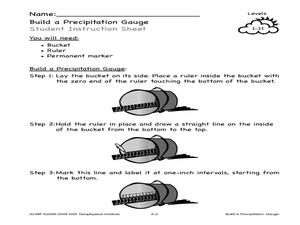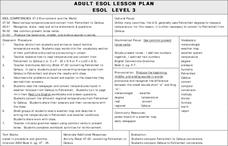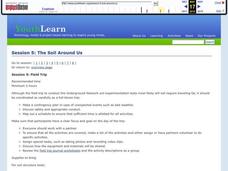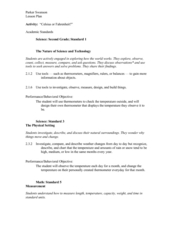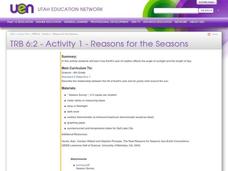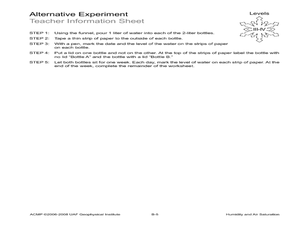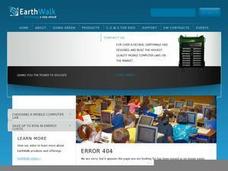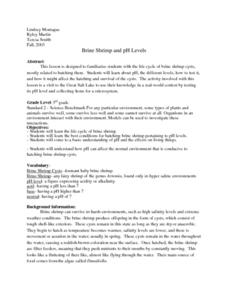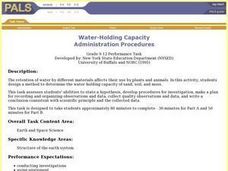Curated OER
Weather for Health
Ninth graders encounter various types of numerical information (represented in multiple ways), much of which is abstract and difficult to comprehend. In this activity, 9th graders will convert given information into bar graphs. In the...
Curated OER
Blowin' In The Wind
Students predict and hypothesize the reasons for wind movement. After viewing a video, they describe the effects of a high and low pressure system and what makes the wind blow. In groups, they construct instruments that measure air...
Curated OER
Build a Precipitation Gauge
Learners build a precipitation gauge. In this weather lesson, students follow step-by-step directions to build a precipitation gauge that can be used to measure snowfall.
Curated OER
Shining the Light on Skin
Students investigate the relationships between certain environmental factors and levels of exposure to sunlight. The variables of location, time of year, and day, and the weather which affect the intensity of the sun are explored in this...
Curated OER
Temperature Conversions
Students discuss the different between the English system of measurement and the metric system. Working ins mall groups, students read the weather map. They convert temperatures from one measurement system to another.
Curated OER
Central Tendency
Fifth graders compare and contrast different sets of data on the basis of measures of central tendency.
Curated OER
How Wet Did It Get?
Students measure the rainfall/snowfall on the playground on a rainy/snowy day with a rain/snow gauge. They draw a bar graph representing the amount of water that fell and observe a satellite image of the clouds and local weather system...
Curated OER
Field Trip Preparation
Young scholars make a contingency plan in case of unexpected events such as bad weather. They discuss safety and appropriate conduct.They map out a schedule to ensure that sufficient time is allotted for all activities.
Curated OER
Probability Of One Event
Students investigate the concept of probability. They use example problems in order to measure the likelihood of various outcomes. The lesson includes dialogue to be used by the teacher during direct instruction. They also use class...
Curated OER
This Lesson Is a Breeze, So Don't Blow It!
Students conduct an experiment to show that air is all around us and that wind is the movement of air. They construct a weather vane to determine which direction the wind is blowing.
Curated OER
Celsius or Fahrenheit?
Second graders create a thermometer. In this Celsius or Fahrenheit lesson, 2nd graders create an individual thermometer to use for measuring the temperature. Students convert the outside temperature.
Curated OER
Classification of Clouds
Students view a cloud slide show presentation and identify types of clouds. They estimate height based on cloud's appearance. They discuss the vague nature of cloud nomenclature and compare it to the English standard measurement system.
Curated OER
Precipitation Monitoring
Students monitor the pH level of the precipitation in their local area for one month. In this hands-on activity, students use lab equipment to measure the pH levels and an online tool to track their findings. Ultimately, students seek to...
Curated OER
Reasons for the Seasons
Sixth graders conduct and analyze a survey that explores public perceptions about the reasons for seasonal change. They measure the changing length of days, observe shadows and discuss how the Earth's axis of rotation affects the seasons.
Curated OER
Ecology: Factors Influencing Animal Populations
Learners assess the factors affecting animal populations. Working in groups they define specific vocabulary terms and complete several activities from "Project Wild."
Curated OER
Humidity and Air Saturation
Students experiment with air saturation. In this earth science instructional activity, students first complete an activity which teaches humidity. Then they use the scientific method to create their own experiments to test how...
Curated OER
Chronic Conics
Fourth graders use two activities to draw four different conic sections. One activity is of a physical nature and one is traditional paper and pencil.
Curated OER
Arctic Microclimates
Students identify, measure, and average micro-climatic temperatures in a particular region. They draw a small-scale map of an area to be sampled (classroom, playground, park, backyard) and identify potential locations for...
Curated OER
Science: Suddenly Snow
Students engage in snow-related activities during the first winter snowfall. After explaining the elements needed for it to snow, they preserve snowflakes on frozen slides and observe them under a microscope. Then, they write diamante...
Curated OER
Brine Shrimp And Ph Levels
Third graders investigate the different ph levels found in water that is tested using simple measurements. The water samples are taken from a local body of water. The ph levels are used to help indicate areas where shrimp can thrive in...
Curated OER
Tracking Current "Earth" Events
Eighth graders utilize Internet research skills, and practice their communication skills by presenting their research to the clas. They actively consider the types of hazards for humans associated with Natural Disaters and ways that...
Curated OER
Using Newsprint as a UV Detector
Students investigate the effects of UV radiation. In this earth science lesson plan, students explain how the time of day relate to UV abundance on Earth. They determine if weather affects the amount of UV that Earth receives.
Curated OER
Water-Holding Capacity
Students design and conduct an experiment to compare the water-holding capacity of sand, soil, and moss. They measure the change in weight for each material after adding the same amount of water to each material.
Curated OER
TE Lesson: Tsunami Attack!
Students examine how earthquakes, volcanoes, and landslides can trigger tsunami waves. They determine how engineers use sensors to detect the dangerous wave, and how they help design building that will survive the wave force and water.


